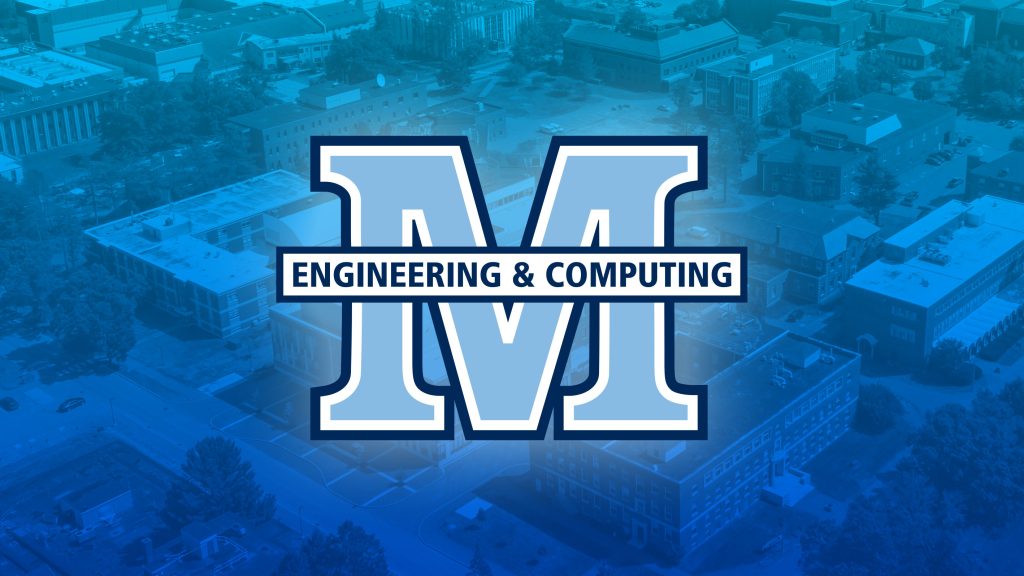Data Science and Engineering
Relevant and in Demand
The private, public, and research sectors rely heavily on data science and engineering for analyzing and translating massive, complex, heterogeneous, and dynamic data into manageable forms, creating new information, and providing insights in order to better understand phenomena and guide decision-making. The advanced knowledge gained through graduate-level data science and engineering programs is needed across a wide range of commercial, non-profit, government, and academic settings.
Graduate programs are offered both on campus and in entirety by distance methods. Discover more about the graduate programs in Data Science and Engineering.
Applying, Enrolling, and Graduating
Programs Offered
MS Data Science and Engineering with Thesis Option
The candidate must complete 30 credits consisting of:
(a) Required Courses:
- DSE 510 Practicum in Data Science and Engineering (3cr),
- SIE 501 Introduction to Graduate Research (1cr),
- SIE 502 Research Methods (1cr), and
- INT 601 Responsible Conduct of Research (1cr)
(b) One, two, or all three of the Foundation Courses unless the material has been covered in previous coursework and the course(s) are explicitly waived by the current instructor and the graduate coordinator,
(c) 12 course credits from at least four of the five Theme Areas
(d) 6 credits of thesis
(c) 3 further course credits from within the Foundation Courses, Theme Areas, or Domain Specializations to arrive at the total of 30 credits
MS Data Science and Engineering with Coursework-Only Option
The candidate must complete 30 credits consisting of:
(a) Required Course: DSE 510 Practicum in Data Science and Engineering (3cr)
(b) One, two, or all three of the Foundation Courses unless the material has been covered in previous coursework and the course(s) are explicitly waived by the current instructor and the graduate coordinator,
(c) 12 course credits from at least four of the five Theme Areas
(d) It is recommended that at least one course includes a substantial practical experience. Options include DSE 589 Graduate Project, DSE 590 Information Systems Internship, or a course from an approved list.
(c) 3 further course credits from within the Foundation Courses, Theme Areas, or Domain Specializations to arrive at the total of 30 credits
Data Science and Engineering Graduate Certificate Curriculum
The Graduate Certificate in Data Science and Engineering (GCDSE) consists of 15 credits. Students in consultation with their adviser should not select courses that are duplicative of courses that may have been taken in the student’s undergraduate degree program. If a previously taken course is duplicative of an elective course in one of the five core theme areas, simply select another course in that area or another theme core area so that the total is still 9 course credits in three of the five Core Theme Areas.
Although copied below, the official graduate certificate requirements may be found in the Graduate Catalog (select current year catalog and then Graduate Programs, Certificates and Specializations > Data Science and Engineering (Certificate)). The GCDSE is offered wholly on-campus as well as entirely online.
The candidate must complete 15 credits consisting of:
(a) Required Course: DSE 510 Practicum in Data Science and Engineering (3cr),
(c) 9 course credits from at least four of the five Theme Areas
(c) 3 further course credits from within the Foundation Courses, Theme Areas, or Domain Specializations
Data Science and Engineering Four Plus One Program
Conditional Acceptance while an Undergraduate Student
By planning ahead during your undergraduate program, you can finish in a single year the Master of Science in Data Science and Engineering. The final year in completing the Master’s degrees may be taken either on campus or online if the final courses desired are offered online.
Application to the Four Plus One Program: Undergraduate students from any degree program at the University of Maine may apply as early as the summer before their junior year for admission. Applications for conditional “early admission” should be received preferably by the middle of the first semester of the junior year and are not accepted after the senior year has commenced.
Note: Students from other UMS campuses may propose participation by having their faculty contact us to cooperatively propose a Four Plus Memorandum of Understanding (MOU) to their campus Provost.
Application for Admission to the MS DSE Four Plus One Program
An applicant should expect to have an overall minimum undergraduate grade point average of 3.25, must have completed at least a semester course in calculus, and must have three letters of recommendation from current or previous university instructors. Provisionally admitted Four Plus One students with an undergraduate grade point average of 3.25 or better may take up to 9 credits of graduate-level courses in Data Science and Engineering toward the MS Data Science and Engineering with Coursework-Only Option. These graduate courses (9 credits) may also count towards the Bachelor’s degree (joint credits) but they must also be part of the student’s Master’s Program of Study in Data Science and Engineering.
Application to the Graduate School: Upon graduation with a bachelor’s degree, and with satisfactory performance in courses taken as an undergraduate, the student may be formally matriculated into the master’s program. Below a 3.0 accumulated undergraduate grade point average should be assumed cause for discontinuation in the program.
By taking a course overload of three credits in the second semester of the Junior year and a course overload in each of the semesters of the Senior year, a motivated student typically may acquire 9 credits (but no more than 12) for graduate school (at undergraduate tuition rates) prior to acquiring their undergraduate degree assuming that they receive a B or better in the courses. These courses, if chosen appropriately, may double count towards both the undergraduate and graduate degree. By taking a 3-credit Internship graduate course (e.g. SIE 590) with a corporation, agency or non-profit organization during the summer, a student may readily complete the coursework master’s degree in a single year after their undergraduate degree. Graduate-level courses to double count must be at the 500-599 level. For Four Plus One students pursuing the MS DSE during and after the undergraduate degree, see the long list of qualifying graduate courses.
In the senior year, provisionally admitted students must submit a formal application to the Graduate School. Four Plus One students must enroll in the master’s program within one semester/term after receiving their bachelor’s degree in order to use the joint credits.
To save course credit tuition dollars for the student, the Application for Admission to the Four Plus One Program is submitted to the appropriate DSE Graduate Coordinator rather than to the graduate school. If a student is accepted and the performance criteria below are met, acceptance into the Four Plus One Program indicates a commitment by the DSE graduate faculty (1) to accept the student’s graduate courses completed while an undergraduate student within their graduate program of study and (2) to support the student’s application for formal admission to the graduate school after completion of the undergraduate degree.
To apply for early admission before or during the junior year, an applicant should expect to have an overall minimum undergraduate grade point average of 3.25, must have completed the University of Maine General Education Requirement in Math and must have three letters of recommendation from current or previous university instructors.
Application for Admission to the MS DSE Four Plus One Program
Continuation in the graduate program is based primarily on performance in the graduate courses and overall grade point average upon graduation from the undergraduate program. Accepted Four Plus One students must submit the full application to graduate school in their senior year. The GRE exam is typically waived for these accepted high performing Four Plus One students.
Students with two or fewer semesters remaining to complete their undergraduate degree program do NOT qualify for the “four-plus-one program” but their applications will be considered as applications within the regular MSIS admissions process. In this case, one may transfer up to two graduate courses prior to formal admission.
Formal Application to Graduate School: The formal application for admission to the graduate program through the graduate school can occur anytime during or just after the senior year of the undergraduate program. Apply
Exceptions to Graduate School Rules: The Graduate School Rules pertaining to Four Plus One Programs may be found in Section 3.3. Exceptions to these rules may be applied for by completing the form for Request for an Exception to Regulation. Exceptions granted in the past have included: (a) allowing a student to count more graduate courses taken at the undergraduate tuition rate than the twelve normally allowed for a Four Plus One student prior to formal entry into graduate school, (b) allowing a student with a 3.25 GPA to double count 9 graduate credits in the undergrad program since their GPA in the major was well above 3.5, and (c) allowing a student who entered as a Four Plus One Student to convert to a thesis program (i.e. Four Plus Two Program) in order to accept a funded graduate assistantship.
Application for Admission to the MS DSE Four Plus One Program
More information
Admissions
Admission to the MS Data Science and Engineering and the Graduate Certificate in Data Science and Engineering is competitive. In the admission process, the graduate faculty considers the potential of applicants to complete a program successfully and achieve a position of leadership in the private, public or research sectors.
Students with undergraduate degrees in any field may apply. However, those with two semesters of calculus (e.g., MAT 126, 127), a semester of statistics (e.g., STS 232 or ECE 316 or CHB 350), and proficiency in programming will have more options for classes they may pursue. Students without these background prerequisites will be required to take foundation courses that count toward the degree. All students must have at least a college level statistics course as a prerequisite to taking the foundations course in statistics. If missing that course, an approved college statistics course may be taken prior to or made part of conditional or provisional admission.
Applications are accepted on a rolling basis and no strict deadlines apply. Thesis-based MS students applying for campus-wide research assistantships or scholarships should complete their application packets by January 1 for fall admission.
MS in Data Science and Engineering
Admission Criteria
- Bachelor’s degree from an accredited four-year U.S. accredited college or university with a 3.0 cumulative or higher GPA, or equivalent international university degree with comparable academic performance (exceptions considered on case-by-case basis)
Application Requirements
- Online application
- Transcripts from previous institutions
- Current resume to include three references
- Essay
- $65 application fee
Graduate Certificate in Data Science and Engineering
Admission Criteria
- Bachelor’s degree from an accredited four-year U.S. accredited college or university with a 3.0 cumulative or higher GPA, or equivalent international university degree with comparable academic performance (exceptions considered on case-by-case basis)
Application Requirements
- Online application
- Transcripts from previous institutions
- Current resume
- Essay
- $35 application
Accelerated 4+1 Program in Data Science and Engineering
UMaine undergraduate students interested in the Four Plus One option should first apply directly to the graduate coordinator in DSE. The Graduate School application must be completed after being accepted into the 4+1 program.
Further Admission Information
Application Content Instructions – One line on the application form states: Please list any member(s) of the University of Maine faculty whom you have identified as a potential faculty mentor. In response to this request you may indicate a preferred major adviser from the list of over fifty DSE graduate faculty members or request that the adviser be drawn from a specific campus department or school. If no preference is stated, we attempt to make a best-match for you. Depending on circumstances, not all preferences may be able to be met.
Application Resume Instructions – A single page is sufficient but submit no more than two. Include academic, employment, and any other germane accomplishments. On your resume please provide contact information for three professional or educator recommendations. Recommenders should be able to comment on your academic strengths, work ethic, responsibilities, accomplishments, career advancement, or ability to be successful. We may or may not solicit recommendations by phone, email or letter as appropriate.
Application Essay Prompt – Discuss motivations, life experiences, and ability to succeed. The essay is evaluated not only for content, but also for intrinsic writing quality and strengths.
Application Fee Waivers – Application fees are waived for:
- Graduates of University of Maine System Schools
- Veterans of the US Armed Forces
- Fulbright Scholars
- Participants in select programs (eg. IRT/McNair)
Transfer Courses – For the MS in DSE, a maximum of six credit hours of graduate coursework taken prior to enrollment in the master’s program may be counted toward the master’s degree. Students will confer with their graduate advisory committee upon admission to determine the transferability of previous coursework. The transfer documentation is best provided on the student’s Program of Study (Master’s POS Form) which is filed with the appropriate signatures. In the event you ever need to change a course on the POS, use the Change in Program of Study form found at the same link
Course Waivers – If some required courses are duplicative of courses that may have been taken in the student’s undergraduate degree program, those courses need not be repeated, and the student will select in consultation with the student’s faculty advisor and the DSE Graduate Coordinator additional approved courses to arrive at the total of 30 credit hours. A course waiver form must be submitted. If waived for a course in a Core Theme area, up to three credits are satisfied in that area and an additional approved course outside of the Core Theme areas may therefore be chosen.
Courses Pursued on Other UMS Campus – Typically up to two courses taken on other UMS campuses as listed under the DSE Graduate Course Groupings may be accepted on a student Programs of Study. For each external course you take you must file a Domestic Study Away Form. Submit the form at the same time you enroll in the course.
On-Leave Status – If you decide to enroll in no courses in either program for one or more regular academic year semesters, your are required to submit a Request for On-Leave Status. If you fail to submit such a request, you are assumed to have left the program by the Graduate School.
Tuition – For more information about tuition and fees please visit the Bursar’s Office webpage. Alternatively, applicants interested in the online program option may consult the Tuition and Fees through UMaineOnline.
International Students – International applicants should review the Office of International Programs page for more information on Visas, financial statements, and other requirements, or should contact an international advisor. Among further documentation that may be required includes:
- TOEFL or IELTS scores (TOEFL minimum of 80 or IELTS 6.5.) – Waived for native English speakers and students graduating from an English-speaking or ESL programs.
- WES or ECE certified transcript translation.
- Certificate of Finances if attending on campus
- Copy of passport or visa if attending on campus
STEM Status – International students applying to the MS DSE on campus should note that the MS DSE program is certified as a STEM program (see U.S. Immigration and Customs Enforcement Student and Exchange Visitor Program and CIP Code 14.3801) potentially allowing a longer postgraduate training stay in the U.S.
Graduate Certificate in Addition to MS DSE – Students currently enrolled in a master’s degree program through the Graduate School who desire to pursue an approved graduate certificate program simultaneously in a subarea or specialization must apply for admission to the certificate program before one-half of the required master’s credits are completed. While the graduate certificate might be in DSE, it might be in another program as well (e.g. Graduate Certificates in Information Systems. GIS, Computing for Educators, Digital Curation, etc.). See the full list of graduate certificates offered through UMaine Online.
Financial Aid
For general information on the range of grants, loans and scholarships available from Federal and other sources for graduate students, contact the Office of Student Financial Aid. The department provides no assistantships for non-research based degrees, however, university wide assistantships and scholarships may be available. All full-time students are eligible to apply. Note: Those seeking a graduate certificate are ineligible for most grants, loans and scholarships.
Some employers offer tuition reimbursement programs, please confer with your HR representative to confirm such a program exists and your eligibility.
Advising Notes
Math Readiness – What is the one last thing that you might still accomplish that might better prepare you for entering computing courses at the University of Maine?
True Story: After reading a book about Kahn Academy assigned in the COS 490 class, one of our top senior students in computer science came to the realization that his math education indeed had many holes in it due to missing concepts somewhere along the line or just forgetting concepts he had previously learned. Even though he had already completed all the required math courses in the curriculum with A’s (including the calculus course sequence), he went back to the third grade level in Kahn Academy and marched though all of the online student lessons up to and through the Algebra materials. Spending an hour or so each evening, it took him several weeks. He aced his graduate record exams for entry into grad school and is convinced that this computer-aided self-learning and review in math made all the difference. Thus, if you want to better prepare yourself for some of your computing courses, you might want to consider following his suggested process before and even after you start your program in the School of Computing and Information Science. If pressed for time, however, perhaps a review of the Algebra I and II materials may be sufficient. See https://www.khanacademy.org/math
Elective Courses Not Contained in the Official UMaine Catalog – All of the elective courses listed above continue to be accepted. Many of these courses at other campuses and in other programs are NOT listed in the official online catalog for pragmatic reasons. However, these elective courses are typically still accepted by the faculty for inclusion on your Program of Study. Other relevant courses may also be petitioned for that are not on the above current list.
Transfer Courses – Any course taken at another university that is included for credit on your Program of Study is viewed as a transfer course. This requires approval in the process of admission or through the approval process for the Program of Study.
Waived Courses – Waived courses are required courses that need not be taken because the student has already covered the subject matter of the course in previous courses. See the SCIS Course Waiver Form. If a course is waived, another course is taken in its place with approval of the Graduate Coordinator in consultation with the faculty. In some instances, the replacement course is prespecified. For instance if SIE 507 is waived, the replacement course is SIE 508 unless that subject matter as well has already been covered in previous coursework by the student.
Taking Courses from Other Campuses – If a course listed above is taken from another campus, it must first be approved on your Program of Study (See Master’s POS or Grad Certificate POS). After approval, you must complete the Domestic Study Away Form (DSAF) for each course taken on another campus. Each DSAF should be submitted near the time in which you enroll in any course from away. Sign it, submit it first to the Graduate Coordinator (harlan.onsrud@maine.edu) and then send the form with those two signatures to the UMaine Graduate School (debbi.clements@maine.edu). The graduate school will forward the form to other campus offices that may need it to validate your active student status, particularly if you are receiving any financial aid.
Programs of Study (POS) – If needed for study away courses or for documenting the acceptance of transfer courses, please complete the POS form immediately upon admission. Otherwise, completing the POS after one or two semesters in the program is fine. (See https://umaine.edu/graduate/ > Students (in the upper menu)> Forms and Documents> Master’s and CAS Program of Study and/or Certificate Program of Study as appropriate.) In completing the form, you may determine the semester that SIE courses are typically offered by consulting (a) the tables found in the Data Science Curriculum that contains as well most of the MSIS courses (search by the course number) or (b) the Graduate Student Guide on pages 11 through 14. For the MSIS Program of Study, include ten and only ten courses on the POS. For the IS Graduate Certificate include only the 5 required courses. All information and your signature must be supplied. If you don’t yet know the exact semester for each course or the exact course(s) you will ultimately pursue, take a best guess for now. You may always alter the form later by submitting a Change in Program of Study form available from the same link.
On-Leave Status – If you decide to enroll in no courses for one or more regular academic year semesters, your are required to submit a Request for On-Leave Status. If you fail to submit such a request, you are assumed to have left the program by the Graduate School.
Application for Graduation – As graduation approaches, you should file a Completion of Degree Requirements form with the Graduate School. This often first requires submission of a Change in Program of Study form to ensure that any changes in your POS have been approved by the faculty. (See https://umaine.edu/graduate/students/forms-and-documents/ > Change in Program of Study and/or Completion of Degree Requirements as appropriate.)
MCEC NEWS






